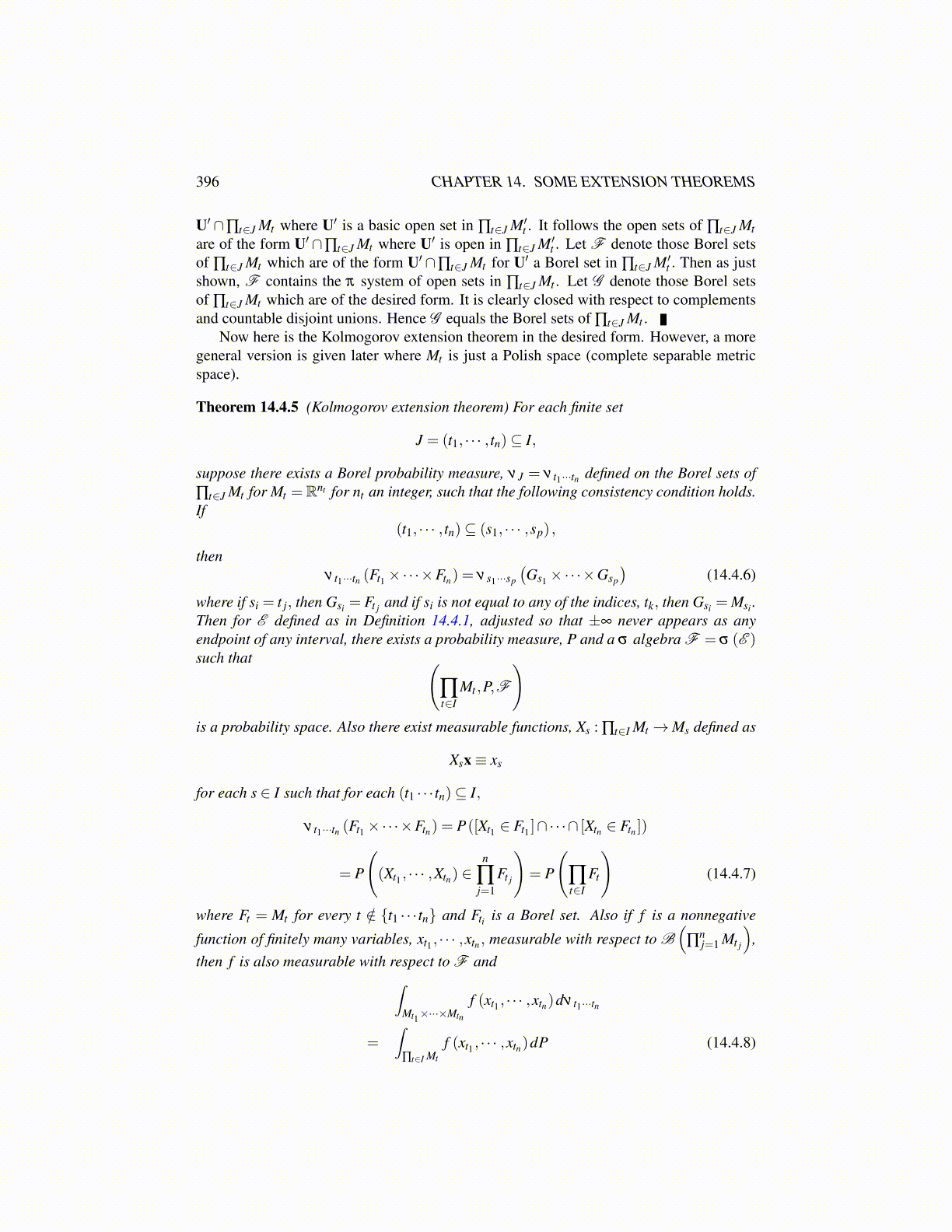
396 CHAPTER 14. SOME EXTENSION THEOREMS
U′ ∩∏t∈J Mt where U′ is a basic open set in ∏t∈J M′t . It follows the open sets of ∏t∈J Mtare of the form U′ ∩∏t∈J Mt where U′ is open in ∏t∈J M′t . Let F denote those Borel setsof ∏t∈J Mt which are of the form U′ ∩∏t∈J Mt for U′ a Borel set in ∏t∈J M′t . Then as justshown, F contains the π system of open sets in ∏t∈J Mt . Let G denote those Borel setsof ∏t∈J Mt which are of the desired form. It is clearly closed with respect to complementsand countable disjoint unions. Hence G equals the Borel sets of ∏t∈J Mt .
Now here is the Kolmogorov extension theorem in the desired form. However, a moregeneral version is given later where Mt is just a Polish space (complete separable metricspace).
Theorem 14.4.5 (Kolmogorov extension theorem) For each finite set
J = (t1, · · · , tn)⊆ I,
suppose there exists a Borel probability measure, νJ = ν t1···tn defined on the Borel sets of∏t∈J Mt for Mt =Rnt for nt an integer, such that the following consistency condition holds.If
(t1, · · · , tn)⊆ (s1, · · · ,sp) ,
thenν t1···tn (Ft1 ×·· ·×Ftn) = νs1···sp
(Gs1 ×·· ·×Gsp
)(14.4.6)
where if si = t j, then Gsi = Ft j and if si is not equal to any of the indices, tk, then Gsi = Msi .Then for E defined as in Definition 14.4.1, adjusted so that ±∞ never appears as anyendpoint of any interval, there exists a probability measure, P and a σ algebra F = σ (E )such that (
∏t∈I
Mt ,P,F
)is a probability space. Also there exist measurable functions, Xs : ∏t∈I Mt →Ms defined as
Xsx≡ xs
for each s ∈ I such that for each (t1 · · · tn)⊆ I,
ν t1···tn (Ft1 ×·· ·×Ftn) = P([Xt1 ∈ Ft1 ]∩·· ·∩ [Xtn ∈ Ftn ])
= P
((Xt1 , · · · ,Xtn) ∈
n
∏j=1
Ft j
)= P
(∏t∈I
Ft
)(14.4.7)
where Ft = Mt for every t /∈ {t1 · · · tn} and Fti is a Borel set. Also if f is a nonnegative
function of finitely many variables, xt1 , · · · ,xtn , measurable with respect to B(
∏nj=1 Mt j
),
then f is also measurable with respect to F and∫Mt1×···×Mtn
f (xt1 , · · · ,xtn)dν t1···tn
=∫
∏t∈I Mt
f (xt1 , · · · ,xtn)dP (14.4.8)